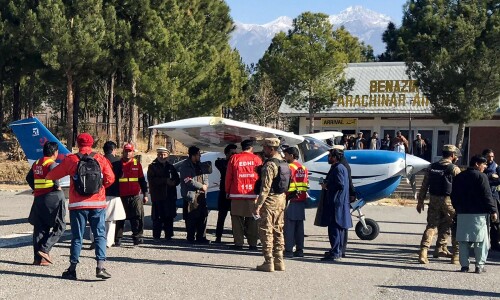Hundreds of protesters in Indian-occupied Kashmir clashed with police on Friday, even as New Delhi said it would begin restoring phone lines after a 12-day communications blackout.
With the central government fearing protests and unrest, the Muslim-majority region has been under lockdown since the first week of August, when the Indian government stripped the region of its autonomy.
Police fired tear gas and pellet-firing shotguns to disperse residents who tried to march down the main road in the main city of Srinagar after Friday prayers.
Related: A reporter finds fear and chaos inside locked-down occupied Kashmir
Protesters hurled stones and used shop hoardings and tin sheets as improvised shields, as police shot dozens of rounds into the crowd. No injuries were reported.
“We are trying to breach the siege and march to the city centre but police is using force to stop us,” one protester told AFP, adding that three people were injured in Thursday's clashes with police officers and reservists.
Sporadic clashes were also reported in other parts of the Kashmir Valley, the main hotbed of resistance to Indian rule for decades, where phone lines and internet connections have been cut off for nearly two weeks.
Major towns and cities in the restive valley remained under curfew, with government forces allowing people to move only on special passes.
Government forces erected steep barricades and used concertina wires to block roads.
No big gatherings were allowed in the valley and most mosques were shut for the second consecutive Friday.
“We want what is ours. We are not begging for anything but demand [that] India should respect its promises,” a second protester told AFP.
“We will not sit back until we achieve complete independence from India,” he said.
The protesters marched along the lanes of Srinagar, carrying black flags — signifying grief — and placards with slogans including “Go India, go back”.
Phone lines
The clashes took place as a top official said that authorities would begin restoring phone lines in Kashmir on Friday evening, including in Srinagar.
Jammu and Kashmir chief secretary BVR Subrahmanyam did not make clear whether mobile phones and internet connections would also be reinstated.
He said the restoration would “(keep) in mind the constant threat posed by terrorist organisations in using mobile connectivity to organise terrorist actions”.
Fearing an angry and potentially violent response to its move to end occupied Kashmir's autonomous status, India deployed 10,000 additional troops — joining the half a million already there — and severely restricted movement and cut telecommunications.
Kashmiri politicians — alongside university professors, business leaders and activists — are among the more than 500 people that have since been taken into custody.
Celebrations for Eidul Azha were massively curtailed on Monday, with Srinagar's main mosque shut. The building remained off-limits on Friday.
Subrahmanyam said the government was aiming for the “earliest return to normalcy while ensuring that terrorist forces are given no opportunity to wreak havoc as in the past”.
Anger
Despite the lockdown, last Friday residents said some 8,000 people took to the streets and that the military used pellet-firing shotguns.
The Indian government confirmed the clashes only after several days had passed, blaming them on stone-throwing “miscreants” and saying its forces reacted with “restraint”.
Tens of thousands of people, most of them civilians, have died in an uprising against Indian rule that has raged since 1989.














































